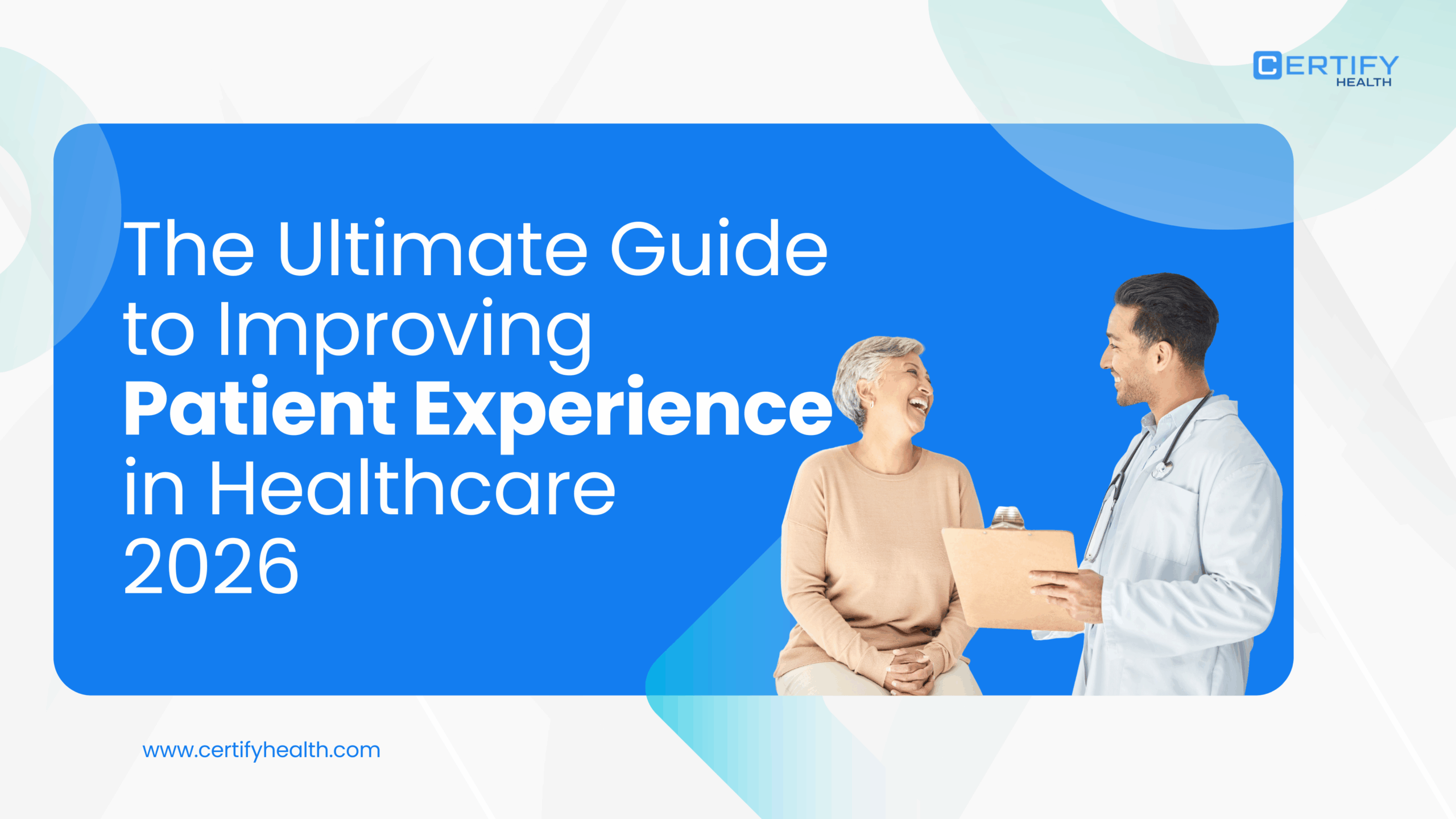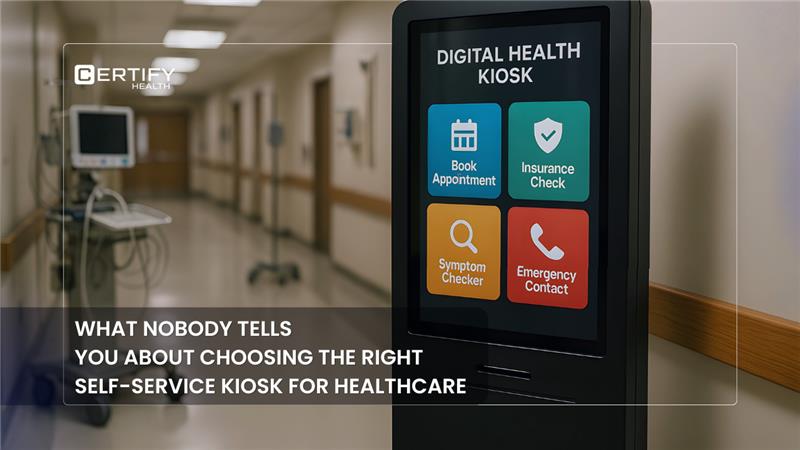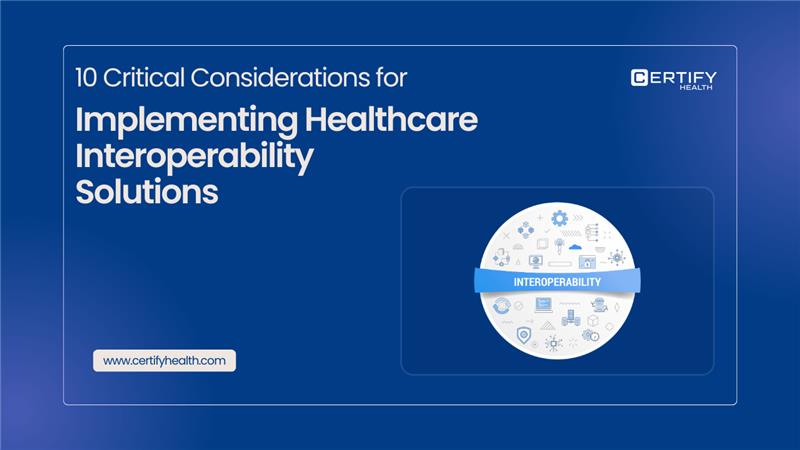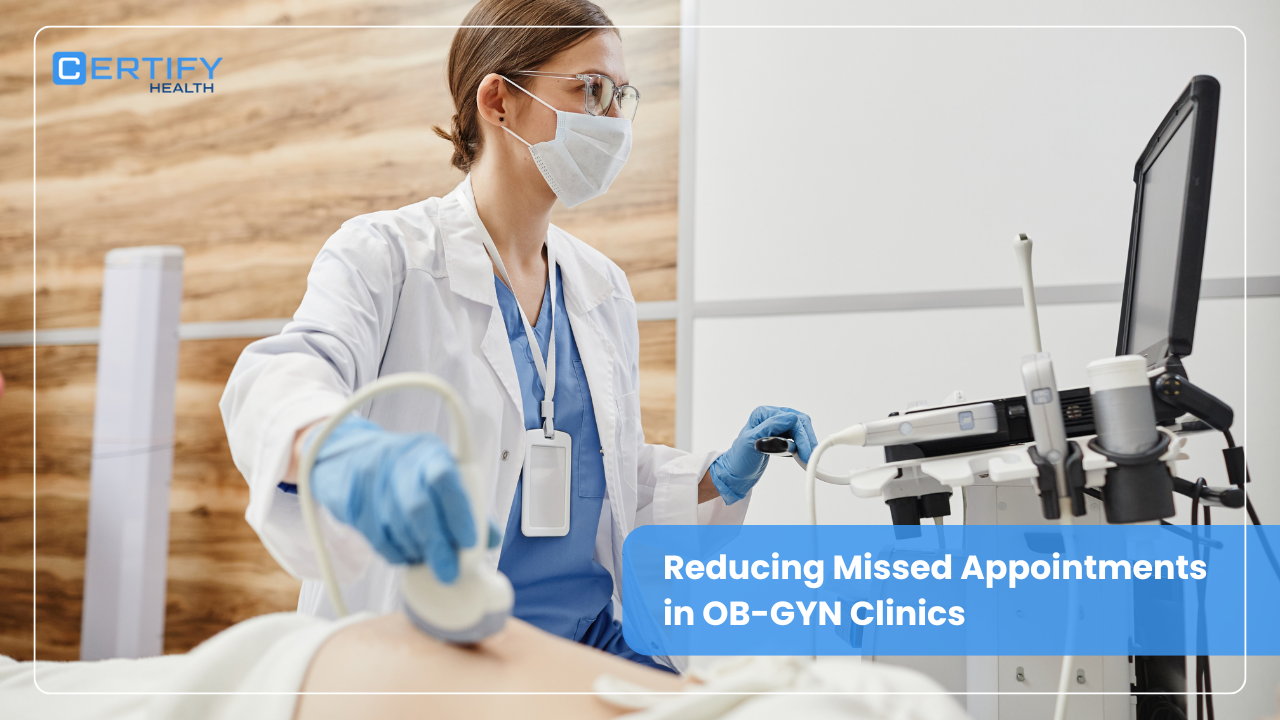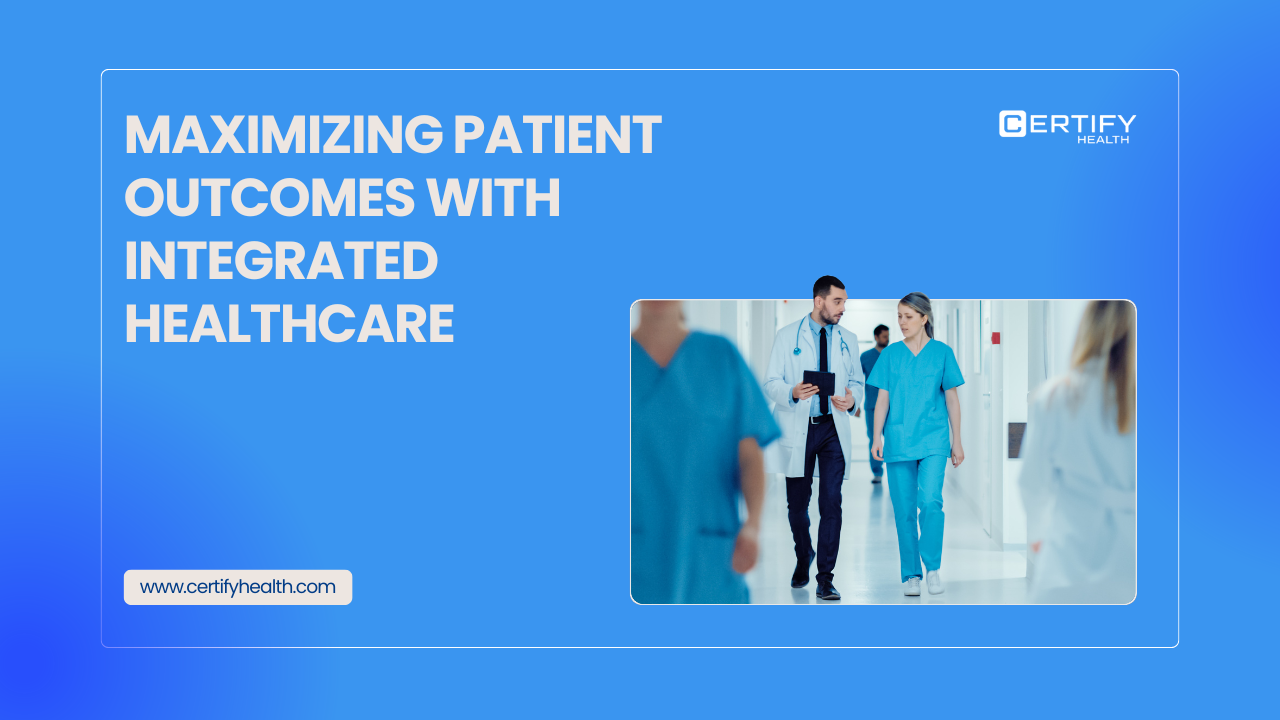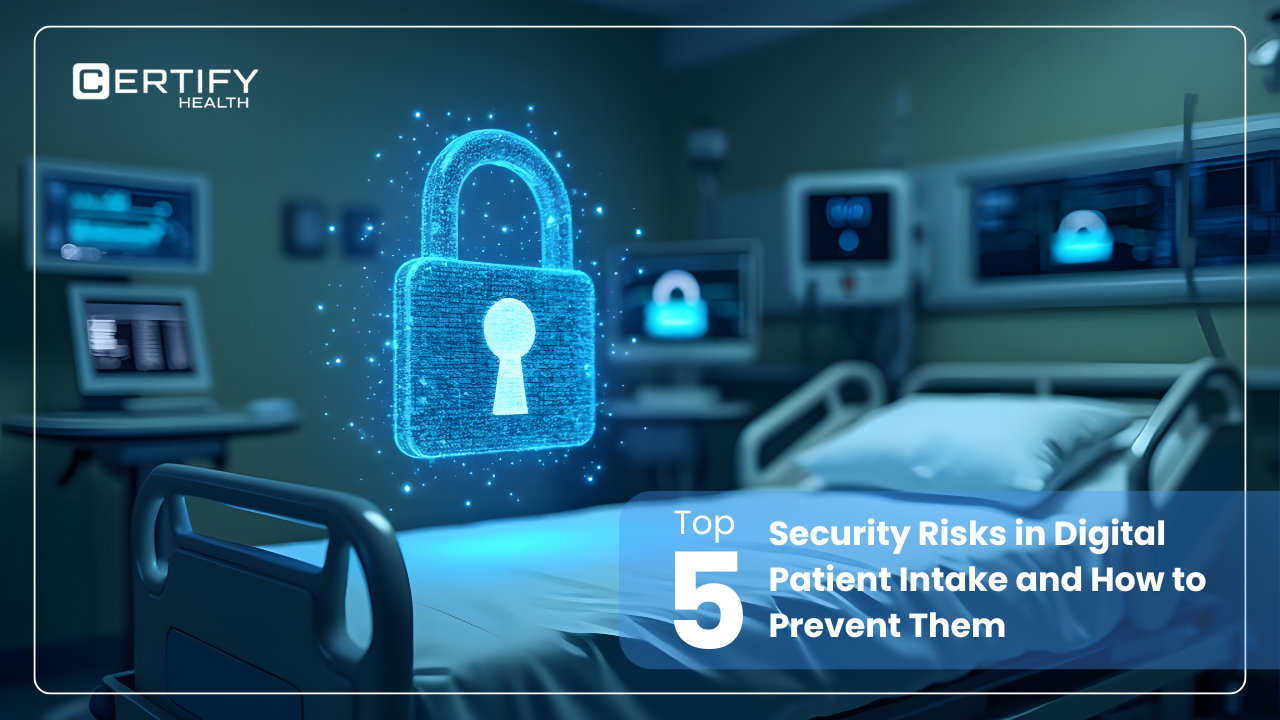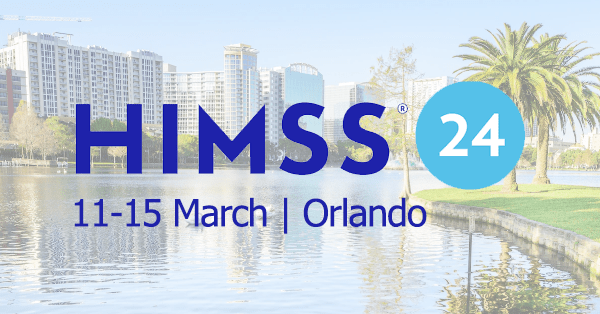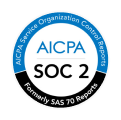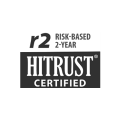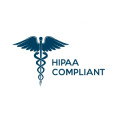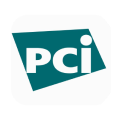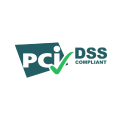Table of Contents
Introduction
Understanding the future of healthcare: By 2025, the landscape of medical practice will be changing faster than ever before. Patients’ demands for faultless digital experiences will only increase, operating costs will continue to rise, and compliance with regulations like HIPAA will become more important than ever.
In this digital era, where 83% of adult users conduct online research to find health-related queries, being competitive is a necessity. It also underscores that patients seek healthcare knowledge, understanding, and the power to make decisions in their health journey for better outcomes.
Medical Practice Management Software helps not just schedule online appointments but also optimizes staff efficiency and profitability. The best practice management software goes beyond the basics, offering AI-powered automation, telehealth integration, and patient portals. Scalability and robust security ensure practices of all sizes stay competitive.
This guide explores the top 10 medical practice management software that will define success for healthcare providers in 2025.
Practice Management Software Success: Addressing Your Biggest Pain Points
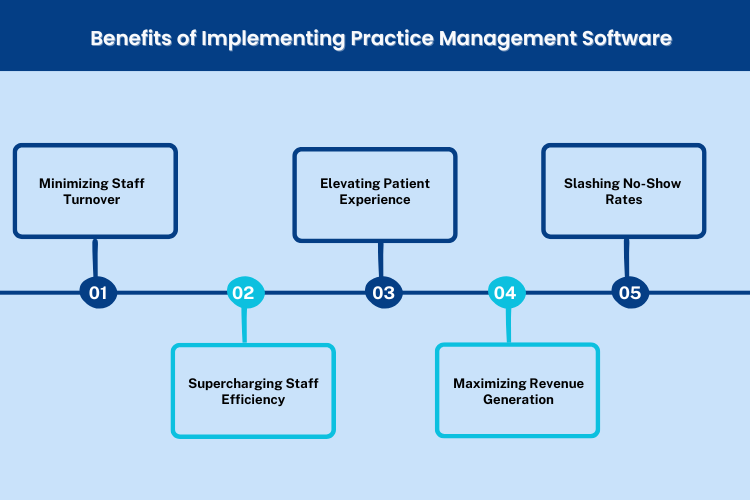
Minimizing Staff Turnover - Investing in Your Team’s Well-being
High healthcare staff turnover is still a major issue in the healthcare sector. The primary causes of it are staff shortages, inadequate systems that make their jobs even more difficult, and excessive manual work that leads to burnout.
Medical Practice Management Software (MPMS) reduces burnout and frees up staff members to focus on patient care by automating monotonous operations like insurance verification and claims submission.
Workflows are streamlined via intuitive interfaces, which also save frustration and training time. Employees feel more empowered and involved in their work when role-based access restriction and clear task assignments are in place. Investing in the appropriate technology directly improves staff satisfaction and retention, and practices experience decrease in turnover
Patient Retention - Building Patient Loyalty Through Exceptional Experiences
Best medical practice management software enhances patient retention through personalized engagement strategies. Preventive care notifications, follow-ups, and appointment reminders are just a few of the customized communications that advanced systems provide.
Practices that employ these strategies experience an increase in patient retention. Digital check-ins via mobile devices or kiosks speed up intake, verify insurance, and prepare personnel for treatment. These developments increase patient flow, shorten wait times, and raise satisfaction. Patient portals give your employees 24/7 access to medical records, encrypted messaging, and self-scheduling.
By improving the patient experience and reducing administrative burden, modern practice management software increases patient happiness and treatment adherence, ultimately fostering long-lasting patient loyalty.
Enhance Patient Experience - Create Raving Fans
With smooth integration and advanced communication features, the best medical practice management software enhance patient experience. It enhances patient happiness and the practice’s reputation by removing redundant labor, reducing delays, and streamlining clinical paperwork, invoicing, and front desk operations.
The telehealth integration, secure texting, and automated health reminders offered by these platforms help to sustain strong patient-provider relationships after visits. Stronger bonds between patients and their doctors are observed among patients who actively participate in their care.
Sophisticated feedback systems analyze patient insights, identifying areas for improvement. Practices using these tools see higher online ratings and more referrals. By delivering a friction-free experience, modern practice management software turns patients into advocates, driving growth through positive word-of-mouth and an enhanced reputation.
Slashing No-Show Rates - Protecting Your Revenue Stream
Advanced medical practice management software combats no-show rates with predictive analytics and personalized, multi-channel reminders. These intelligent systems reduce missed appointments by up to 30%, optimizing schedules and protecting revenue.
Interactive confirmations let patients easily confirm, reschedule, or cancel, giving practices advance notice and improving resource allocation. Automated waitlist functionality fills canceled slots efficiently, ensuring provider productivity and minimizing patient wait times.
Schedule utilization increases in practices that use automated waitlists, increasing revenue and improving patient satisfaction. Medical practice management software enhance patient experience and operational efficiency by simplifying scheduling and cutting down on inefficiencies, which propels long-term success for healthcare practitioners.
Supercharging Staff Efficiency - Doing More with Less
Medical practice management software intelligently automates time-consuming processes like eligibility verification, prior authorizations, and claims processing, hence revolutionizing staff efficiency. Integrated claims scrubbing in sophisticated platforms, such as Athenahealth, lowers denials and speeds up payments.
Quicker issue solving and proactive management are made possible by real-time dashboards, which offer instant visibility into important performance indicators. The best solutions ensure full information access while removing duplicate data entry through seamless integration with imaging centers, lab systems, and EHRs. Practices that use fully integrated practice management software report weekly time savings of an average of four hours per clinician for documentation.
In addition to increasing patient volume and care quality, these efficiency improvements allow practices to run with smaller administrative teams. Employees who prioritize meaningful work over tedious administrative duties report higher levels of job satisfaction.
Maximizing Revenue Generation - Leaving No Money on the Table
By expediting reimbursement and improving revenue cycles, sophisticated medical practice management software improves revenue generation for practices. Automating charge capture, identifying coding problems, and monitoring claims lowers errors and speeds up cash flow.
Intelligent denial management identifies trends, helping practices address systemic reimbursement challenges. Granular financial analytics offer insights by provider, procedure, location, and payer, guiding strategic decisions on services, contracts, and resources.
Predictive algorithms find patients who require more care, increasing income and guaranteeing compliance. Healthcare that uses these technologies can see growth in their revenue generation as a result of better service offerings, proving that data-driven insights result in operational efficiency and profitability.
Top 10 Practice Management Software of 2025
CERTIFY Health, the best medical practice management software in our list is designed carefully to meet the demands of healthcare practices of all sizes. It simplifies practice operations by offering automated solutions, easy integrations with Epic, AdvancedMD, Flatiron, etc.
It benefits practices by streamlining operations with features like biometric-enabled verification and check-in, digital patient intake, real-time insurance verification, revenue cycle management for practice, provider-patient communication, and automated payment collection. Patients benefit from seamless self-scheduling and two-way communication, while practices improve efficiency with revenue cycle automation and compliance tools. CERTIFY Health ensures smoother workflows, enhanced patient engagement, and optimized financial performance—all in one powerful platform.
Key Features:
- Online Scheduling & Pre-Registration: The patient scheduling software by CERTIFY Health enables patients to pre-register and self-schedule, significantly cutting down on staff phone time and simplifying appointment scheduling.
- Biometric-Enabled Verification & Authentication: CERTIFY Health offers FaceCheck biometric authentication to ensure positive patient identification and to prevent fraud.
- Patient Check-In: Automating the check-in process and offering self-service alternatives via PC, tablet, mobile, or kiosk, helps you to reduce front desk congestion and improve patient convenience.
- Digital Patient Intake: Simplify intake processes by using HIPAA Compliant digital forms that let patients fill out required documentation online. This will cut down on manual overload and guarantee that all necessary information is gathered beforehand.
- Real-Time Insurance Verification: Reduce claim denials and expedite co-pay collection by automating insurance eligibility verification. This will increase revenue generation while reducing manual labor.
- Patient Payment Management: CERTIFY Health streamlines payments from pre-check-in to post-consultation with follow-ups and reminders. It helps identify payment patterns for better revenue cycle management, verifies insurance, collects co-pays upfront, offers flexible plans, and optimizes collections with billing analytics.
- Patient Communication: Friendly reminders, queue alerts, and real-time updates will keep patients engaged. Two-way texting allows for easy communication and a smooth relationship.
PracticeSuite is a full-featured medical practice administration software made to simplify a range of clinical and administrative duties in medical facilities. As yet another top option for medical practice requirements, it provides a completely integrated platform that includes scheduling, electronic health records (EHR), billing, and reporting.
Key Features:
- Medical billing: improves revenue collections and expedites payment procedures using revenue cycle management-specific features.
- Practice Management: Optimizes cash collections, decrease the no-show rates, and oversees the entire medical practice using cloud-based solutions.
- Appointment Scheduling: Improves practice efficiency with cloud-based scheduling software, facilitating easy appointment bookings.
- EHR/EMR: Offers secure video and phone consultations together with verified electronic health records that can be used for remote patient treatment.
- Patient Engagement: Improves connectivity and communication by providing patients with access to their records and additional online services.
- Electronic Payment Services: Speeds up patient payments with convenient in-person and online options, including card-on-file and payment plans.
To improve patient care and expedite office operations, OmniMD offers a wide range of healthcare technology solutions. To address the unique requirements of different medical specializations, a range of digital health technologies, including revenue cycle management (RCM) and electronic health records (EHR), are available.
Key Features:
- EHR Software: Simplifies healthcare procedures with effective patient data management, AI-driven medical charting, and editable templates.
- Appointment Scheduling: Decrease no-show rates and streamlines scheduling with an easy-to-use booking system and automated reminders.
- Medical Billing Software: Improves revenue cycle management through billing analytics, coding assistance, and automated claims processing.
- Telehealth: Permits digital prescriptions, remote patient interaction, and secure video conferencing for virtual consultations.
- Remote Patient Monitoring: Enhances the management of chronic diseases and preventative care by enabling ongoing monitoring of patient vitals and health data.
- Pre-Authorization: Expedites approvals and lessens administrative strain by automating insurer pre-authorization inquiries.
SimplePractice is a complete practice management application for medical practitioners, including doctors, therapists, and counselors. Its simple and intuitive design facilitates administrative procedures, boosts workflow productivity, and enhances client communication.
Key Features:
- Schedule Appointments: Uses calendar sync, client self-booking, and automatic reminders to streamline appointment scheduling and improve time management.
- Insurance Verification: Facilitates the filing of insurance claims, eligibility verification, and automated claim monitoring to guarantee smooth payouts.
- Telehealth: HIPAA-compliant, secure video conferences that facilitate smooth virtual patient interaction for remote consultations.
- Billing & Payments: Integrated billing for seamless financial administration includes automated invoicing, credit card processing, and payment tracking.
- EHR (Electronic Health Records): To keep patient records efficient and well-organized, use digital charting, secure documentation, and editable note templates.
CureMD is a leading provider of state-of-the-art medical practice management software, providing a comprehensive platform that integrates Electronic Health Records (EHR), Practice Management, Medical Billing, and Patient Engagement capabilities. Utilizing state-of-the-art technology, they hope to enhance patient care, boost productivity, and simplify clinical procedures.
Key Features:
- Electronic Health Records (EHR): EHR system that is easy to use and adaptable, with the goal of improving patient experience, performance, and quality.
- Medical Billing Service: An efficient, more straightforward, and more economical method of boosting cash flows and accelerating payment.
- Digital Check-In: Securely register, check-in and reduce wait-time & front-desk congestion.
- Reputation Management: Tools and strategies to monitor and enhance the practice’s online reputation, ensuring positive patient feedback and engagement.
Claimocity is a best medical practice management software designed for hospitalists, SNF-based providers, and multi-facility physicians. It simplifies complex revenue cycle workflows, automates charge capture, and enhances financial transparency with real-time reporting. With mobile-first technology and AI-powered automation, Claimocity reduces – minimizes claim denials, administrative burdens, and accelerates reimbursements—all while ensuring compliance with regulatory standards.
Key Features:
- Charge Capture: Instantly record patient encounters from SNFs, hospitals, or clinics with AI-assisted coding for maximum reimbursement.
- Revenue Cycle Management (RCM): Automate claims submission, denial management, and collections to improve cash flow.
- Real-Time Reporting & Analytics: Access revenue insights, track provider productivity, and monitor billing trends for data-driven decisions.
- Clinic Notes: Capture structured or free-text notes with mobile-friendly documentation tools.
- Compliance & Audit Protection: Ensure HIPAA compliance and maintain detailed audit trails with secure documentation.
- Facility Integration: Seamlessly sync patient data with hospital EHRs, billing platforms, and practice management systems.
Medesk is another best medical practice management software designed to help private healthcare providers to streamline their workflows. This software has various advanced features like telemedicine, online booking, EHR, etc.
Medesk is secure and compliant, offering secure data encryption and customizable access controls. It is built with purpose to automates administrative tasks, improves patient interactions and enables clinics to enhance staff efficiency, reduce costs, and deliver high-quality healthcare services.
Key Features:
- Scheduling: Its appointment scheduling enables patients to book appointments online, with schedules syncing automatically with external calendars.
- Electronic Health Records (EHR): Collect all patient data, including medical history, lab results, and consultation notes, into a centralized platform for easy access.
- Telemedicine: Video consultations enable patients to connect with doctors remotely from any mobile devices, supporting telehealth services.
- Automated Communication: Provides tools for professional interaction with patients, including automated SMS and email notifications, enhancing patient engagement and patient loyalty.
- Security: Ensures the safety of patient data with secure data encryption and customizable access rights for colleagues, maintaining confidentiality and compliance.
Zanda Health is a medical practice management software made to streamline the practice operations. It is all-in-one platform that supports healthcare practices of all size to simply their administrative tasks, enable them to enhance staff efficiency, patient care, and maintaining cash-flow.
Key Features:
- Calendar Management: it allows an individual, or a group, or a personal appointments, enhancing scheduling efficiency.
- SMS and email Communication: This feature enable automated appointment reminders and direct communication with clients, reducing no-shows.
- Telehealth Video Calls: It provides secure, end-to-end encrypted video consultations without the need for additional logins or downloads.
- Online Forms: Allows creating and distributing secure, customizable forms to collect client information, with responses automatically saved in the client’s record.
- Client Management: Centralizes all client details, including communications and appointment history, ensuring secure and accessible records.
- Payments & Invoices: This feature streamlines invoicing and payment collection with customizable invoices and integrated payment processing, simplifying financial management.
Greenway Health is another best practice management software or health information technology service provider, designed to transform healthcare technology beyond standard Electronic Health Records (EHR). Their integrated EHR & practice management system (PMS) combines robust financial, clinical, and analytics technology with customizable features to help healthcare providers streamline operations and improve patient care.
Key Features:
- Online Scheduling & Digital Registration: Offer patients with convenience of self-service and online registration, improving access and engagement.
- Self-Service Payment Solutions: Greenway brings you flexible & integrated financial systems that improves payment collections and patient satisfaction.
- Practice Management: it offers features like centralized billing, revenue cycle workflows, and data security to optimize operations and financial performance.
- Patient Engagement Tools: enable secure patient communication, automated scheduling and payment reminders, and customizable notifications to strengthen provider-patient relationships.
- Robust Integrations: Seamlessly integrates with various tools and platforms to enhance workflow efficiency.
End-to-end software solutions tailored for healthcare facilities is Experity Health. Its integrated platform optimizes revenue cycle management, improves patient engagement, and streamlines workflows. Experity helps healthcare clinics increase productivity, compliance, and patient happiness.
Key Features:
- EMR & Practice Management (PM): Offers workflows optimized for urgent care, enabling patient registration in under three minutes and charting of common visits in less than 60 seconds.
- Patient Engagement: offers digital registration, dynamic queue management, automated patient communications, online appointment scheduling with Google integration, reputation management tools with AI-powered issue monitoring, and more.
- Revenue Cycle Management: maintains compliance and speeds up reimbursements by managing the complexity of medical coding, billing, and payer contracts.
Making the Right Choice: A Strategic Decision
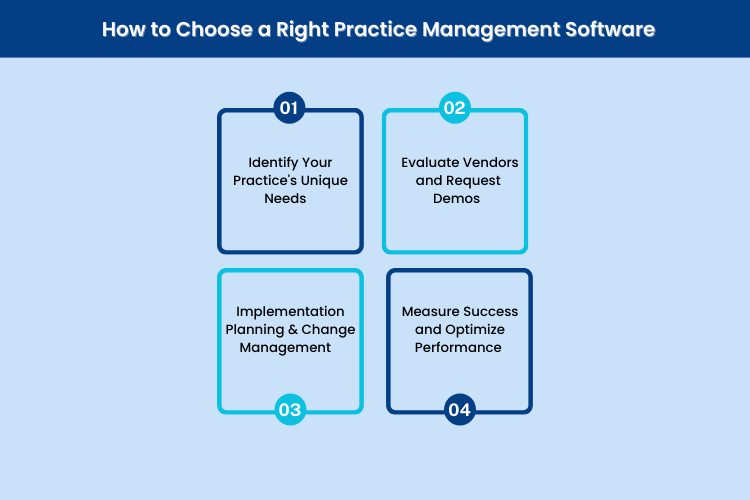
Identify Your Practice’s Unique Needs
Practices should involve stakeholders from different departments in comprehensive needs assessments prior to assessing particular medical practice management software. Through this approach, existing problems, inefficiencies in workflow, and lost opportunities are identified and should be addressed by the new system.
To direct the selection process, the evaluation should include both technical criteria and goals for process improvement. Making the distinction between necessary and optional features is a crucial next step after creating a thorough needs list.
By setting priorities, practices can concentrate on finding solutions to their biggest problems without needless complexity or expenditure. As the practice develops, the assessment should take into account both the present and expected future demands.
Evaluate Vendors and Request Demos
Structured evaluation tools ensure objective comparison across multiple medical practice management software options. Effective scorecards include weighted criteria covering functionality, usability, integration capabilities, implementation requirements, support options, and total cost of ownership. This systematic approach prevents decisions based solely on impressive demonstrations or compelling sales presentations.
Beyond feature sets, successful implementations depend heavily on vendor partnerships throughout the transition process and beyond. During evaluations, practices should thoroughly investigate implementation methodologies, training options, customer support availability, and performance guarantees. References from similar practices provide valuable insights into the vendor’s reliability and responsiveness.
Implementation and Change Management Plan
Comprehensive implementation planning takes into account go-live support, user training, workflow redesign, and data migration. Plans that are effective have reasonable deadlines with sufficient leeway for unforeseen difficulties. Both internal staff commitments and vendor-provided services should be considered when allocating resources for effective transitions to new medical practice management software.
For practice management software to be implemented successfully, change management plan is still essential. Frequent communication should address concerns, acknowledge difficulties, and emphasize advantages. During the transition, champions from various departments can facilitate peer support and enthusiasm-boosting activities. Constant feedback systems guarantee that problems are found and fixed promptly.
Measuring Success and Optimizing Performance
Before implementing a software, practices should set baseline management and once the software is implemented, they should closely monitor improvement across essential KPIs.
These KPIs should include both experiential metrics (e.g., Patient satisfaction ratings) and operational metrics (e.g., improvement in patient collections).
Systematic tracking ensures that the practice management software delivers the expected benefits while identifying areas for further optimization. Implementing medical practice management software is a continuous process of improvement and optimization rather than a one-time occurrence.
Conclusion
As discussed in this guide, Medical Practice Management Software (MPMS) can transform the healthcare landscape by improving staff efficiency, enhancing patient satisfaction, and driving profitability through improving cash flow.
Making the correct decision based on your practice’s expanding needs, compliance, and long-term viability is crucial for success, especially as the number of practice management software options increases.
Investing in the right solution today means enhanced patient experiences and smoother workflows tomorrow. Ready to elevate your practice? Schedule A Personalized Demo with our experts and find the perfect PMS for your needs.
The right technology can optimize revenue generation, minimize administrative cost, and enhance operations for healthcare facility of any size, even small clinics. Don’t hesitate; get the greatest PMS solution for your clinic!



